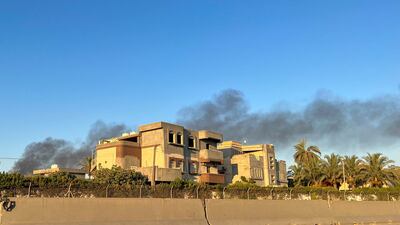At least 13 people were killed overnight during fighting between rival Libyan militias that broke out in the capital Tripoli overnight, emergency services and local media outlets said.
Among those killed on Friday were three civilians from the area and a child, 12, said emergency services spokesman Osama Ali. He also said 30 people had been wounded.
It followed a gun battle late on Thursday in Ain Zara, a densely populated neighbourhood of eastern Tripoli, between the Al Radaa force and the Tripoli Revolutionaries Brigade, reported by local media.
The cause of the fighting was unclear. Videos shared on social media showed local militia forces deploying and heavy fire being exchanged across the night sky.
Osama Ali said 60 students were trapped by the fighting in university dormitories until they were evacuated by the ambulance service.
The clashes marked the latest flare-up in the fighting that first erupted on June 10, but the civilian casualties were the first in the capital for months.
Footage posted on social media also showed dozens of vehicles abandoned in the middle of streets as their drivers fled the violence.
The unrest forced flights by Libyan Airlines and Alamia to be diverted from Tripoli's Mitiga airport to Misrata, about 200 kilometres east of the capital.

The fighting threatens a relative peace established after nearly a decade of civil war, and comes amid a political stalemate between two rival power centres based in Tripoli and in the east of the country.
The Libyan presidential council, part of the Tripoli-based government set up under a UN-led process last year, called on Friday for all forces involved to return to their bases immediately.
Tensions have risen since the Tripoli-based government led by Abdul Hamid Dbeibah last week appointed a new head of the National Oil Corporation in place of its long-serving chairman.
Mr Dbeibah and the presidential council were chosen at a UN-sponsored gathering of Libyan representatives last year to oversee elections scheduled for December 2021. The polls were never held amid disputes over the electoral process, prompting the eastern-based parliament, the House of Representatives, to declare that Mr Dbeibah’s mandate had expired.
The parliament appointed Fathi Bashagha, a powerful former interior minister in a previous UN-recognised government, as the new prime minister, in a move not recognised by the government in Tripoli.
Mr Bashagha attempted to enter the capital with his supporters in May, leading to clashes that killed one person. He then withdrew and is now operating a separate administration out of the city of Sirte.
Both prime ministers have support from among the armed factions that control territory in the capital and other western Libyan cities.
With reporting from agencies.

